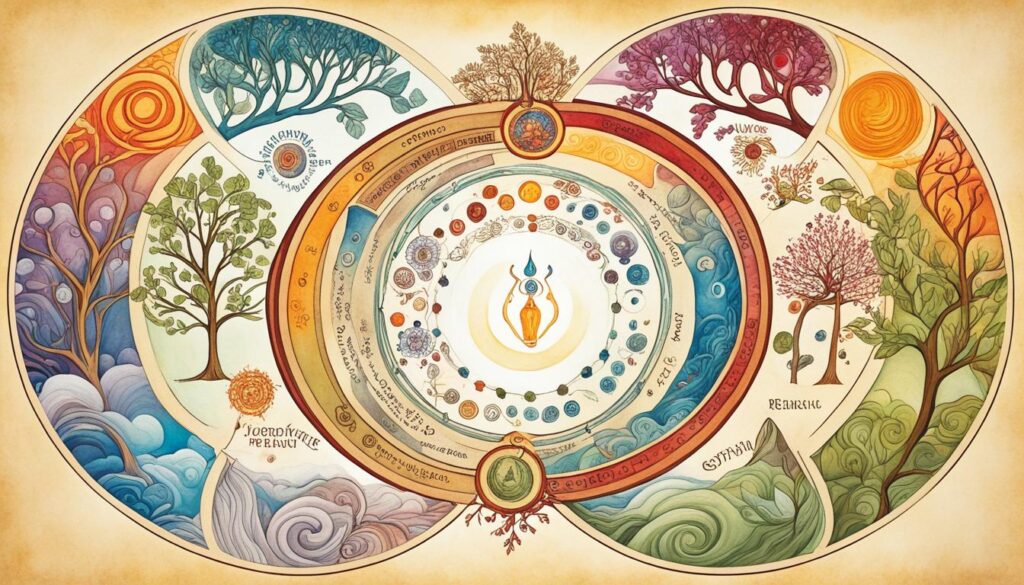“Thousands of candles can be lit from a single candle, and the life of the candle will not be shortened. Happiness never decreases by being shared.” – Buddha
Welcome to the enlightening world of Buddhism. With its rich history and profound teachings, Buddhism offers a unique perspective on the nature of existence and the path to liberation. Whether you are curious about this ancient religion or seeking guidance for personal growth and self-discovery, exploring the facts of Buddhism can be a transformative journey.
Key Takeaways:
- Buddhism is one of the world’s major religions, originating in South Asia around 5th century B.C.E.
- The Buddha’s teachings revolve around the Four Noble Truths and the Noble Eightfold Path.
- Buddhists believe in the concept of rebirth and karma, with the goal of attaining enlightenment and escaping the cycle of suffering.
- Buddhism has had a global reach, influencing art, literature, and philosophy.
- Mindfulness meditation, a core practice in Buddhism, has gained popularity for its benefits in reducing stress and enhancing well-being.
The Life of Siddhartha Gautama, the Buddha
Embark on a journey through the remarkable life of Siddhartha Gautama, the revered figure who achieved enlightenment and became known as the Buddha. Born a prince in the 5th century B.C.E., Siddhartha initially lived a life of opulence and privilege.
However, his encounters with the suffering and hardships faced by others profoundly impacted him. Stirred by compassion and a desire to seek a higher truth, Siddhartha renounced his luxurious lifestyle in pursuit of spiritual enlightenment.
Under the shade of the Bodhi tree, a sacred site in India, Siddhartha engaged in intense meditation and self-reflection. It was here that he attained enlightenment, experiencing a profound awakening and transcending the limitations of human suffering.

The Buddha’s teachings center around the Four Noble Truths, which provide profound insight into the nature of suffering and the path to liberation. Through his teachings, he illuminated the way towards achieving enlightenment and breaking free from the cycle of rebirth.
The life of Siddhartha Gautama, the Buddha, serves as a timeless inspiration, offering guidance and wisdom for those seeking a deeper understanding of the human experience.
The Four Noble Truths and Buddhist Philosophy
At the core of Buddhism lies the profound wisdom encapsulated in the Four Noble Truths. These timeless truths reveal the fundamental nature of human existence and provide invaluable guidance on the path to enlightenment. By understanding and embracing these truths, one can embark on a transformative journey towards liberation from suffering.
- The Truth of Suffering: Buddhism acknowledges that suffering is an inherent part of human existence. From birth to death, we encounter various forms of physical, emotional, and mental pain. It arises from our desires, attachments, and the ignorance that veils our understanding of reality.
- The Truth of the Origins of Suffering: The second noble truth pinpoints the origins of suffering in desires and ignorance. Our craving for pleasure, material possessions, and the pursuit of a self-centered existence perpetuates the cycle of suffering. Ignorance of the true nature of reality further deepens our attachment to these desires, leading to discontent and dissatisfaction.
- The Truth of the Cessation of Suffering: The third noble truth offers hope and liberation. It proclaims that the end of suffering is attainable through enlightenment. By transcending desires, attachments, and ignorance, one can break free from the cycle of suffering and find lasting peace and happiness.
- The Truth of the Path to the Cessation of Suffering: The fourth noble truth outlines the Noble Eightfold Path, which serves as a roadmap for achieving liberation. This path encompasses eight interconnected principles that guide individuals towards enlightened living. It includes right understanding, right thought, right speech, right action, right livelihood, right effort, right mindfulness, and right concentration.
Buddhist philosophy takes these foundational teachings even further, emphasizing the importance of mindfulness, compassion, and ethical conduct as essential components of spiritual practice.
Mindfulness in Buddhist Practice
Mindfulness plays a central role in Buddhist philosophy and practice. It involves cultivating a heightened awareness of the present moment, free from judgment and attachment. By maintaining a state of mindful presence, individuals can develop a deep understanding of their own minds, emotions, and responses to the world around them.
Through mindfulness meditation, practitioners learn to observe their thoughts, sensations, and experiences with clarity and equanimity. This practice enhances self-awareness, concentration, and emotional well-being. It allows individuals to transcend the distractions and fluctuations of the mind, leading to a deeper connection with their inner wisdom and the true nature of reality.
The Importance of Compassion and Ethical Conduct
Compassion lies at the heart of Buddhist philosophy. It involves cultivating a deep sense of empathy, kindness, and altruism towards all beings, not just oneself. By acknowledging the interconnectedness of all existence, Buddhists strive to alleviate suffering and promote the well-being of others.
In addition to compassion, the ethical conduct prescribed by Buddhist teachings forms the foundation of a virtuous and harmonious life. Buddhists embrace principles such as refraining from harming living beings, speaking truthfully, acting with honesty and integrity, and cultivating wholesome intentions and actions.
This ethical framework serves as a guide for individuals to lead a life of righteousness, integrity, and spiritual growth, fostering positive relationships and contributing to a more compassionate and harmonious world.
By embracing the teachings of Buddhism and incorporating its philosophy into your life, you can embark on a transformative journey towards self-discovery, inner peace, and profound wisdom.
Reincarnation, Karma, and the Cycle of Rebirth
Beliefs in Buddhism encompass the concept of rebirth or reincarnation, where the soul transitions into different bodies across lifetimes. This cyclic process is influenced by the principle of karma, which denotes the consequences of one’s actions. Buddhists understand that choices have far-reaching effects that shape future experiences. Positive actions generate wholesome outcomes, while negative actions give rise to suffering. Karma thus operates as a moral law that promotes responsibility and accountability.
According to Buddhist teachings, escaping the cycle of rebirth and achieving enlightenment, known as nirvana, necessitates transcending desire, ignorance, and attachments. This spiritual journey requires individuals to cultivate self-awareness, wisdom, and compassion. By progressing on the Eightfold Path, Buddhists strive to purify their minds, liberate themselves from suffering, and ultimately attain liberation from the endless cycle of birth and death.
By exploring the intricate relationship between rebirth, karma, and liberation, one gains insight into the profound wisdom Buddhism offers. It encourages self-reflection, ethical conduct, and accountability for one’s actions. Through the practice of mindfulness and the pursuit of inner transformation, individuals can align their lives with the teachings of Buddhism, creating harmony and promoting the well-being of oneself and others.
Reincarnation and Karma in Buddhism: An Interconnected Cycle
In Buddhism, the concepts of reincarnation and karma are deeply interconnected, shaping the path to liberation. The understanding of how actions, intentions, and thoughts influence future existences is fundamental to this belief system. Karma is driven by the notion that every intentional action has consequences that manifest in this lifetime and subsequent rebirths. Positive karma results in favorable circumstances and rebirths into more fortunate realms, while negative karma leads to unfavorable conditions and rebirths in less fortunate states.
Through an individual’s actions, they accumulate karma, shaping their destiny and determining the quality of their future lives. The consequences of karma do not end with death; they carry forward into subsequent lives. This cycle of cause and effect perpetuates the journey of reincarnation and the opportunity for spiritual growth and liberation.
| Karma Quality | Outcomes |
|---|---|
| Positive Karma |
|
| Negative Karma |
|
The cycle of rebirth and karma introduces the notion of moral responsibility and the power of transformative actions. It encourages individuals to cultivate virtuous qualities, such as loving-kindness, compassion, and wisdom, to generate positive karma. By doing so, one not only shapes their current existence but also influences future lives, enhancing the potential for attaining enlightenment and breaking free from the cycle of rebirth.

Reincarnation, karma, and the cycle of rebirth are profound aspects of Buddhist philosophy and practice. They offer individuals an understanding of the interdependence between their actions and future outcomes, inspiring them to lead virtuous lives and cultivate inner transformation. By engaging with these teachings, one can embark on a transformative journey towards liberation and enlightenment.
Buddhism’s Global Reach and Influence
Buddhism, with its rich history and profound teachings, has spread its influence across the globe, making it the fourth largest religion with approximately 360 million followers. Originating in South Asia, Buddhism has found a home in various countries and regions, including China, Japan, Thailand, Sri Lanka, and Tibet.
But how did Buddhism manage to transcend cultural boundaries and leave an indelible mark on different societies?
One reason for Buddhism’s global reach is its adaptability. The teachings of Buddhism can be interpreted and applied in different cultural contexts, allowing for local adaptations while preserving the core principles. This flexibility has enabled Buddhism to resonate with people from diverse backgrounds, fostering its growth and influence worldwide.
Another factor that contributes to the spread of Buddhism is its integration with local customs and traditions. For example, in China, Buddhism assimilated elements of Confucianism and Taoism, resulting in a unique blend of beliefs and practices. This syncretism allowed Buddhism to coexist with other religions and gain acceptance among the Chinese population.

The artistic and literary heritage of Buddhism has also played a role in its global influence. Buddhist art, characterized by intricate sculptures, vibrant paintings, and serene temple architecture, has captivated audiences worldwide. The depiction of Buddhist stories and teachings in these art forms serves as a visual medium for spreading the philosophy and inspiring spiritual contemplation.
Furthermore, Buddhist meditation practices have gained recognition and popularity beyond religious circles. The emphasis on mindfulness and compassion has found resonance in modern psychology, leading to the integration of Buddhist techniques in therapeutic approaches and self-improvement programs. The adoption of mindfulness meditation by individuals seeking inner peace and stress relief has further expanded Buddhism’s reach.
Buddhism’s Influence in Different Regions
| Region | Influence |
|---|---|
| China | Influenced by Buddhist philosophy integrated with Confucianism and Taoism |
| Japan | Development of various schools of Buddhism, such as Zen and Pure Land |
| Thailand | Theravada Buddhism as the dominant religion with a significant impact on Thai culture |
| Sri Lanka | Theravada Buddhism as the major religion shaping Sri Lankan society |
| Tibet | Tibetan Buddhism and the influence of the Dalai Lama as a global spiritual leader |
The global reach and influence of Buddhism cannot be understated. From its humble beginnings in South Asia, it has evolved into a global spiritual force, shaping the lives of millions across different continents. Its teachings continue to inspire individuals to seek enlightenment, embodying principles of mindfulness, compassion, and inner transformation.
By delving into the history of Buddhism and understanding its teachings, one can gain a deeper appreciation for the profound impact it has had on diverse cultures and societies.
Mindfulness and Meditation in Buddhism
One significant aspect of Buddhist practice is mindfulness meditation. This practice involves cultivating awareness of the present moment and developing a non-judgmental attitude towards one’s thoughts and experiences. Mindfulness meditation has gained popularity in contemporary society as a means to reduce stress, enhance well-being, and improve mental clarity. It is often seen as a practical tool for personal growth and self-discovery.

Through mindfulness meditation, practitioners learn to observe their thoughts and emotions without attachment or judgment. This heightened awareness allows individuals to develop a deeper understanding of their inner experiences, leading to greater clarity and insight. By focusing on the present moment, mindfulness meditation helps individuals let go of regrets about the past or anxieties about the future, promoting a sense of peace and tranquility.
Buddhism teaches that the practice of mindfulness meditation can lead to profound transformation and liberation from suffering. By becoming more aware of the impermanent and ever-changing nature of reality, individuals can cultivate a sense of detachment and freedom from external circumstances. Mindfulness meditation also fosters compassion and empathy, as it encourages individuals to cultivate a non-judgmental attitude towards themselves and others.
Benefits of Mindfulness Meditation
The practice of mindfulness meditation has been extensively researched and has demonstrated numerous benefits for physical, mental, and emotional well-being. Some of the key benefits include:
- Reduced stress and anxiety
- Improved focus and concentration
- Enhanced self-awareness and emotional intelligence
- Increased resilience and coping skills
- Improved sleep quality
Moreover, mindfulness meditation has been integrated into various therapeutic approaches, such as Mindfulness-Based Stress Reduction (MBSR) and Mindfulness-Based Cognitive Therapy (MBCT), to help individuals manage symptoms of depression, anxiety, and other mental health conditions.
By incorporating mindfulness meditation into their daily lives, individuals can develop a greater sense of inner peace and well-being. It offers a valuable tool for managing stress, cultivating self-awareness, and deepening one’s connection with the present moment.
Conclusion
Buddhism offers profound insights into the nature of human existence, the causes of suffering, and the path to liberation. Its teachings on mindfulness, compassion, and ethical conduct can provide valuable guidance for addressing personal and societal challenges.
By exploring the rich history, beliefs, and practices of Buddhism, you can gain a deeper understanding of this influential religion and the wisdom it has to offer. Buddhism teachings emphasize the importance of being present in the moment, showing kindness and empathy towards others, and living a moral and ethical life.
Through mindfulness meditation, you can cultivate awareness and develop a greater sense of self-discovery. Buddhism beliefs encourage us to let go of attachment, desires, and ignorance to break free from the cycle of suffering and achieve liberation.
Embark on a spiritual journey and embrace the enlightening teachings and beliefs of Buddhism. Whether you seek personal growth, inner peace, or a deeper understanding of the human experience, Buddhism offers a wellspring of wisdom and guidance to assist you along the way.
FAQ
What is Buddhism?
Buddhism is one of the world’s major religions that originated in South Asia around the 5th century B.C.E. It is based on the teachings of Siddhartha Gautama, also known as the Buddha.
What are the Four Noble Truths?
The Four Noble Truths are the foundation of Buddhist teachings. They explain the nature of suffering, its causes, and the path to achieving enlightenment.
What is mindfulness meditation?
Mindfulness meditation is a practice in Buddhism that involves cultivating awareness of the present moment and developing a non-judgmental attitude towards one’s thoughts and experiences.
What is the role of karma in Buddhism?
Karma is the concept that refers to the consequences of one’s actions. Good actions lead to positive outcomes, while negative actions lead to suffering. It influences the cycle of rebirth.
How has Buddhism spread across the world?
Buddhism has spread to various countries and regions, including China, Japan, Thailand, Sri Lanka, and Tibet. It has influenced art, literature, architecture, and meditation practices.

